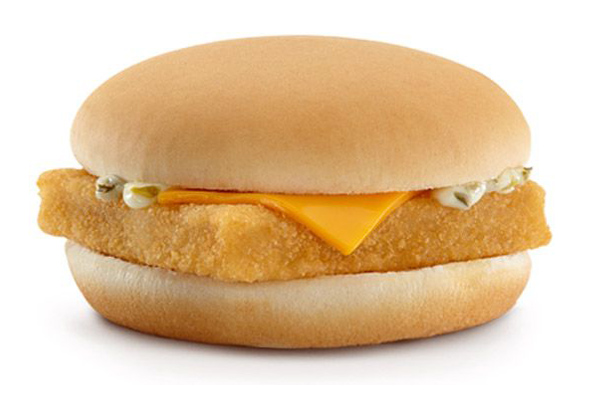McDonald’s isn’t usually one to make headlines for positive news, but that’s just what they’ve done this week. The company announced yesterday that it will commit to serving only certified-sustainable seafood at all of its locations, making it the first U.S. national restaurant chain to do so.
This, of course, is big news for sustainability advocates as McDonald’s is the one of the largest single buyers of fish in the U.S.
 Consumers will notice the change not only in the company’s packaging, which will now include a blue ecolabel of the Marine Stewardship Council (MSC). But also in a marketing effort which will roll out as soon as the changes are official in early February. In addition to their famous Filet-O-Fish sandwich, McDonald’s will also launch a new product called Fish McBites, which will be made with MSC-certified, wild-caught Alaska pollock.
Consumers will notice the change not only in the company’s packaging, which will now include a blue ecolabel of the Marine Stewardship Council (MSC). But also in a marketing effort which will roll out as soon as the changes are official in early February. In addition to their famous Filet-O-Fish sandwich, McDonald’s will also launch a new product called Fish McBites, which will be made with MSC-certified, wild-caught Alaska pollock.
As reported by the Huffington Post, the MSC is an independent non-profit organization that sets standards for sustainable fishing based on the impacts a fishery has on its ecosystem, its fish stock health, and its fishery management system.
Though McDonald’s became the first U.S. restaurant chain to commit to sustainable seafood this week, it was first certified in 2005. This second push for sustainability was a result of the company re-auditing its seafood supply to ensure all of its chains were meeting current standards. As well, some certifications had changed since 2005 and the company wanted to ensure it was meeting certification on all accounts.
McDonald’s senior vice president of U.S. supply chain and sustainability, Dan Gorsky, said in a company press release that he believes this move was essential for the future of the company.
“McDonald’s collaboration with the Marine Stewardship Council is a critical part of our company’s journey to advance positive environmental and economic practices in our supply chain. We’re extremely proud of the fact that this decision ensures our consumers will continue to enjoy the same great taste and high quality of our fish with the additional assurance that the fish….can be traced back to a fishery that meets MSC’s strict sustainability standard.” 
The announcement was also good news to the World Wildlife Fund, the leading organization in wildlife conservation and endangered species. “World Wildlife Fund supports the MSC as the only credible standard for sustainable wild-caught seafood,” said WWF vice president and managing director of fisheries, Bill Fox. “McDonald’s decision to display the MSC ecolabel on its seafood products gives consumers a way to contribute to the conservation of the world’s biodiversity.”
This commitment to sustainability was a big move not only for McDonald’s but also for the fishing industry, as overfishing has become a huge problem in the U.S. in the last several decades.
Brooklyn-based non-profit Charity Sub spotlighted sustainable seafood as its charitable cause of the month in November 2026. The group reported that “Overifshing, if left unchecked, threatens to wreak havoc not only on marine ecosystems, but also on the humans that depend upon the ocean for their dinner, and their livelihood.”
While the average consumer may not realize it, one in five people on the planet depend on fish as their primary source of protein, and 75 percent of all fisheries are overfished. Charity Sub reported that if no further sustainability efforts are made, experts have predicted all fisheries will collapse by 2050.
This isn’t the first sustainability effort on behalf of McDonald’s. The company announced in March 2026 that it would make an effort to serve more sustainable beef. However, those efforts have since been ill-monitored. Regardless, seafood is a good place to start as far as we’re concerned, and we’re pleased to see such an influential company doing so much good for the cause.
Also Read:
The Chinese Consider McDonald’s One of Their Safest Options
What’s in a McNugget? Canadian McDonald’s Reveals This and Other Menu Secrets
McDonald’s Posting Nutrition Information on Menus Nationwide, But Will it Do Any Good?
